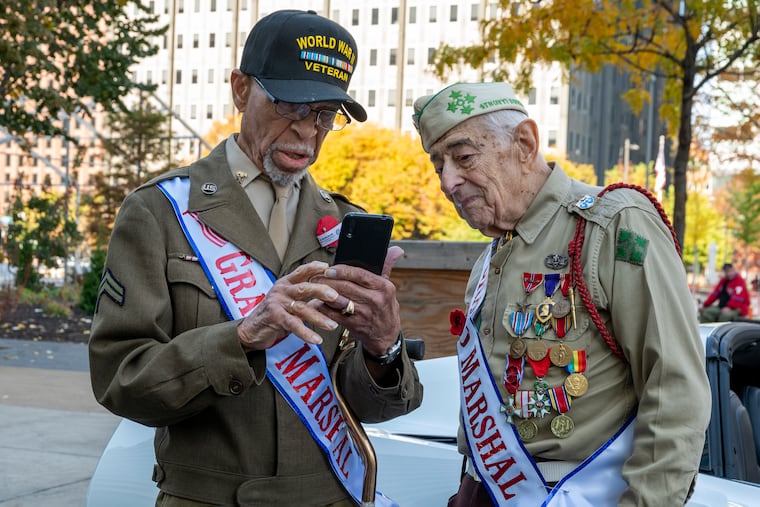Two WWII veterans, co-grand marshals of Philly’s parade, share their war memories
Both men, 100-year-old Cpl. Benjamin Berry and 98-year-old PFC Jake Ruser, believe that every American should serve in the Armed Forces — despite the challenges.

Cpl. Benjamin Berry and Pfc. Jacob “Jake” Ruser were just two of 16 millionAmericans who fought in World War II. Now they are waging a different battle — to keep the history of the war and the sacrifices of those who fought alive in our memories.
The duo, members of the Delaware Valley chapter of the Battle of the Bulge Association, were celebrated on Nov. 5 as honorary co-grand marshals of the Philadelphia Veterans Parade. They have made it their mission to tell their tale of getting drafted, leaving home — Conshohocken for Ruser, 98, and Willow Grove for Berry, 100 — enduring boot camp, sailing for Europe, and surviving a war that took the lives of more than 400,000 Americans.
Leaving home
It’s a story of ordinary men in extraordinary times and they remember every detail of the camaraderie, the courage, the horrors — and for Barry, the racial indignities suffered by African American soldiers on the home front.
“I was drafted on Aug. 18, 1943,” recalled Ruser. “I was 18 and a half.” The Army gave Ruser three weeks to get his affairs in order before reporting, although he admitted that without a career, spouse or child he really didn’t have much to organize.
Berry, who was also drafted in 1943, got his first notice in January, but was given a deferment in order to complete Abington Senior High School, where he was a member of the marching band. He graduated in June, one of only three African Americans in the class. A month later he was off to Camp Ellis in Illinois for basic training.
For both men those were their last carefree days before a harsher reality set in.
“I remember one experience. We were in St. Louis when we went into a restaurant — similar to a White Tower. It was three of us, all Black and we got food. But when we tried to sit down they told us, ‘You can’t eat in here,’” Barry said. “We were in uniform and we get that kind of treatment.”
Berry, who served in a segregated quartermaster unit before the military was integrated in 1948, had never experienced overt racial treatment.
The horrors of war
Berry landed at Omaha Beach in Normandy, 20 days after D-Day, the largest amphibious invasion in military history, where troops suffered heavy causalities but forced Germany into retreat. He vividly recalled the German pillboxes, concrete reenforced bunkers, in the hills lining the beaches that were almost impervious to artillery fire.
“We were sitting ducks coming off the boats,” said Berry of the soldiers who fought in the battle. “It’s amazing as many survived as they did. The German pillboxes were cemented in the hillside and they had a great view.”
After Normandy, Berry’s unit followed the infantry units across Europe and was in the Ardennes Forest when the Allies and German forces fought in the Battle of the Bulge, the deadliest battle of the war, in which more than 19,000 Americans died. It was Germany’s last and unsuccessful counteroffensive.
Ruser participated in the Battle of the Hürtgen Forest, a thick-wooded landscape of ravines and ridges, during one of the coldest winters on record. As a litter-bearer, his job was to retrieve seriously wounded soldiers from the front lines, about 1,300 to 1,500 feet away, while dodging gunfire and navigating rough terrain.
”Hürtgen Forest, in my opinion, was the worst battle the U.S. Army fought in WWII in the European theater of operations,” Ruser said in an interview this March with the U.S. Army. “It was hell on Earth.”
“It makes you mature, grow up quick,” Berry said. “It’s killed or be killed. It’s either him or you.”
Coming home
Germany officially surrendered on May 7, 1945. Berry participated in the liberation of Dachau concentration camp. The Jewish prisoners were little more than “skin and bones” having been “starved and worked to death” Berry said.
Berry attended Bok Vocational School on the GI Bill to learn paper hanging. Because Blacks were not allowed in the paper hangers’ union, he opened his own business that he ran for 60 years. Ruser worked as a Department of Defense civilian for 32 more years.
Both men have been highly decorated. Earlier this year Berry was formally inducted into the Quartermaster Hall of Fame. They give talks frequently to help encourage interest in WWII because the number of living veterans, most in their 90s, is dwindling rapidly. The U.S. Department of Veterans Affairs estimates less than 120,000 WWII veterans are still alive, with 131 dying daily.
Both men, who each served about two years, believe that every American should serve despite the challenges.
“I believe everyone should get a few years in the military to get some background. It makes you think different and it’s beneficial to the whole nation,” Ruser told U.S. Army.